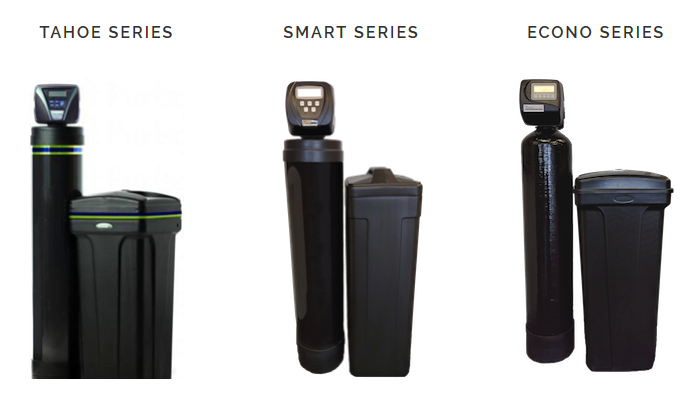Water softeners are an essential appliance in many homes, but they’re also surrounded by a surprising number of water softener myths and misconceptions.
If you’ve ever wondered whether water softeners are bad for your health, too expensive to maintain, or ineffective, you’re not alone.
In this blog, we’ll debunk five of the most common water softener myths and provide the facts you need to make informed decisions about your water quality.
Myth 1: Water Softeners Make Water Salty
Myth 2: Soft Water is Unhealthy to Drink
Myth 3: Water Softeners Are Too Expensive to Operate
Myth 4: Water Softeners Waste Water
Myth 5: Water Softeners Remove All Contaminants
Contact the professional at WaterSmart if you have questions about your water softener or to get a new one installed!
Water Softener Myths Debunked
Myth 1: Water Softeners Make Water Salty
One of the most persistent water softener myths is that they make your water salty.
The truth is, water softeners don’t add salt to your water; they use sodium to replace hard minerals like calcium and magnesium through a process called ion exchange.
While a small amount of sodium may be present in softened water, it’s typically minimal—about as much as in a slice of bread.
For those concerned about sodium intake, potassium-based water softeners are an excellent alternative.
Soft water contains about as much sodium as a slice of bread.
Myth 2: Soft Water is Unhealthy to Drink
Another common water softener myth is that soft water is unsafe to consume.
However, softened water is perfectly safe for most people.
The softening process doesn’t remove essential minerals; it simply replaces hard minerals with sodium or potassium.
For parents preparing baby formula, some may worry about using softened water. While it is safe to use softened water for baby formula in most cases, it’s essential to check the sodium levels in your water. If your water is extremely hard, the softening process may result in slightly higher sodium content, which could be a concern for infants.
To address this, consider using a reverse osmosis system alongside your water softener. This combination provides ultra-purified water that is both soft and free from excess sodium, ensuring it’s perfectly safe for your baby’s needs.
R/O is also good if you’re on a low-sodium diet and concerned about sodium levels in your softened water.
Check sodium levels if using soft water for baby formula.
Myth 3: Water Softeners Are Too Expensive to Operate
There's a misconception that water softeners are prohibitively expensive to maintain.
While there are costs associated with purchasing and installing a water softener, the long-term savings on plumbing repairs, appliance maintenance, and energy bills can outweigh the initial investment.
For instance, softened water prevents scale buildup in pipes and appliances, extending their lifespan and improving efficiency.
Regularly adding salt and conducting basic maintenance is affordable and easy, especially when compared to the costs of hard water damage.
Investing in a water softener saves you money in the long run.
Myth 4: Water Softeners Waste Water
Many believe that water softeners waste large amounts of water during the regeneration cycle.
While it’s true that traditional systems require water to flush out hard minerals, modern water softeners are designed to be much more efficient.
High-efficiency models use significantly less water and regenerate only when necessary.
Additionally, many systems can be programmed to regenerate at specific intervals, minimizing waste and conserving resources.
WaterSmart’s line of water softeners.
Myth 5: Water Softeners Remove All Contaminants
A common water softener myth is that these systems are a one-size-fits-all solution for water quality.
While a water softener effectively removes hardness-causing minerals, it does not eliminate other contaminants like bacteria, chlorine, or heavy metals.
For comprehensive water treatment, you may need to pair your water softener with other filtration systems, such as reverse osmosis or UV filters.
These combinations ensure your water is both soft and free of harmful impurities.
Water softener myths are often misunderstood, but separating fact from fiction can help you make the best decision for your home.
By debunking these common myths, we’ve shown that water softeners are safe, cost-effective, and beneficial when used correctly.
Whether you’re dealing with hard water stains or aiming to improve your appliance longevity, a water softener is an excellent investment.
Let Us Set You Up With a New Water Softener
If you’re still unsure about water softeners or want expert advice on choosing the best system for your home, contact us today.
Our team is here to answer your questions, provide personalized recommendations, and help you enjoy the benefits of softer, cleaner water!
Don’t wait—let us help you transform your water quality today.
Our customers have come to recognize us as a company that provides superior customer service combined with the highest quality products at the best prices.
“We’ve had WaterSmart install a RO drinking system, water softener, electric hot water heater and plumbing for a new dishwasher. They do a great job and are efficient & thorough. Thanks guys!”






